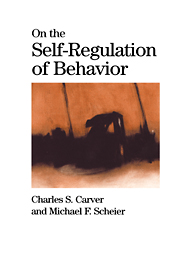Book contents
- Frontmatter
- Contents
- Preface
- Acknowledgments
- 1 Introduction and Plan
- 2 Principles of Feedback Control
- 3 Discrepancy-Reducing Feedback Processes in Behavior
- 4 Discrepancy-Enlarging Loops, and Three Further Issues
- 5 Goals and Behavior
- 6 Goals, Hierarchicality, and Behavior: Further Issues
- 7 Public and Private Aspects of the Self
- 8 Control Processes and Affect
- 9 Affect: Issues and Comparisons
- 10 Expectancies and Disengagement
- 11 Disengagement: Issues and Comparisons
- 12 Applications to Problems in Living
- 13 Hierarchicality and Problems in Living
- 14 Chaos and Dynamic Systems
- 15 Catastrophe Theory
- 16 Further Applications to Problems in Living
- 17 Is Behavior Controlled or Does It Emerge?
- 18 Goal Engagement, Life, and Death
- References
- Name Index
- Subject Index
16 - Further Applications to Problems in Living
Published online by Cambridge University Press: 05 June 2012
- Frontmatter
- Contents
- Preface
- Acknowledgments
- 1 Introduction and Plan
- 2 Principles of Feedback Control
- 3 Discrepancy-Reducing Feedback Processes in Behavior
- 4 Discrepancy-Enlarging Loops, and Three Further Issues
- 5 Goals and Behavior
- 6 Goals, Hierarchicality, and Behavior: Further Issues
- 7 Public and Private Aspects of the Self
- 8 Control Processes and Affect
- 9 Affect: Issues and Comparisons
- 10 Expectancies and Disengagement
- 11 Disengagement: Issues and Comparisons
- 12 Applications to Problems in Living
- 13 Hierarchicality and Problems in Living
- 14 Chaos and Dynamic Systems
- 15 Catastrophe Theory
- 16 Further Applications to Problems in Living
- 17 Is Behavior Controlled or Does It Emerge?
- 18 Goal Engagement, Life, and Death
- References
- Name Index
- Subject Index
Summary
I fought all day to forget it was an Olympic Games. When I thought about the Olympics and trying to win the gold, it was just overwhelming. I tried to convince myself, “This is just another decathlon. Just get through it and you'll be fine.”
(Dan O'Brien, 1996 Olympic gold medalist in the decathlon)Perhaps that is why desire causes men calamity. By identifying with our desires and taking them too seriously … we actually create a climate inhospitable to the free and easy fulfillment of those desires.
(Tom Robbins, Jitterbug Perfume)I've failed over, and over, and over again in my life.
And that is why I succeed.
(Michael Jordan, for Nike)The preceding pair of chapters introduced some concepts that haven't been widely discussed by personality and social psychologists until recently. Our goal there was to indicate how these ideas complement and supplement those presented earlier in the book. We continue to examine them in this chapter, but now in relation to behavioral problems. Just as the earlier ideas had implications for understanding problems (Chapters 12 and 13), so do the newer ones. In this chapter we explore implications of dynamic systems and catastrophe theories for problems and their alleviation.
CATASTROPHES AND PSYCHOLOGICAL PROBLEMS
In Chapter 15 we described the cusp catastrophe as a construct that's applicable to several aspects of human experience. It also appears to be helpful in conceptualizing certain kinds of problems.
- Type
- Chapter
- Information
- On the Self-Regulation of Behavior , pp. 296 - 316Publisher: Cambridge University PressPrint publication year: 1998



